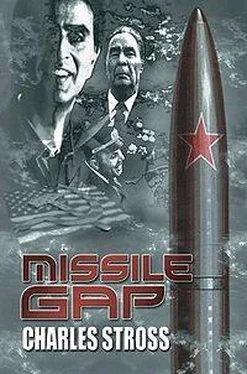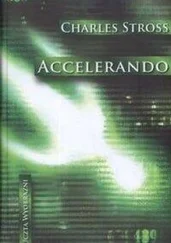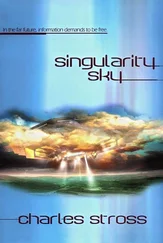"Concrete," says Borisovitch, holding up a lump of crumbled not-stone from the foot of the wall for Yuri to see.
"Indeed." Gagarin nods. "Any idea what this was?"
"Not yet." The camera crew is already filming, heading down a broad boulevard between rows of crumbling foundations. "Only the concrete has survived, and it's mostly turned to limestone. This is old."
"Hmm." The First Cosmonaut walks round the stump of wall and steps down to the foundation layer behind it, looking around with interest. "Interior column here, four walls — they're worn down, aren't they? This stuff that looks like a red stain. Rebar? Found any intact ones?"
"Again, not yet sir," says Borisovitch. "We haven't looked everywhere yet, but…"
"Indeed." Gagarin scratches his chin idly. "Am I imagining it or are the walls all lower on that side?" He points north, deeper into the sprawling maze of overgrown rubble.
"You're right sir. No theory for it, though."
"You don't say." Gagarin walks north from the five-sided building's ruin, looks around. "This was a road?"
"Once, sir. It was nine meters wide — there seems to have been derelict ground between the houses, if that's what they were, and the road itself. "
"Nine meters, you say." Gorodin and the academician hurry to follow him as he strikes off, up the road. "Interesting stonework here, don't you think, Misha?"
"Yessir. Interesting stonework."
Gagarin stops abruptly and kneels. "Why is it cracked like this? Hey, there's sand down there. And, um. Glass? Looks like it's melted. Ah, trinitite."
"Sir?"
Borisovitch leans forward. "That's odd."
"What is?" asks Misha, but before he gets a reply both Gagarin and the researcher are up again and off towards another building.
"Look. The north wall." Gagarin's found another chunk of wall, this one a worn stump that's more than a meter high: he looks unhappy.
"Sir? Are you alright?" Misha stares at him. Then he notices the academician is also silent, and looking deeply perturbed. "What's wrong?"
Gagarin extends a finger, points at the wall. "You can just see him if you look close enough. How long would it take to fade, Mikhail? How many years have we missed them by?"
The academician licks his lips: "At least two thousand years, sir. Concrete cures over time, but it takes a very long time indeed to turn all the way to limestone. and then there's the weathering process to take account of. But the surface erosion…yes, that could fix the image from the flash. Perhaps. I'd need to ask a few colleagues back home."
"What's wrong?" the political officer repeats, puzzled.
The first cosmonaut grins humorlessly. "Better get your Geiger counter, Misha, and see if the ruins are still hot. Looks like we're not the only people on the disk with a geopolitical problem…"
Chapter Ten: Been Here Before
Brundle has finally taken the time to pull Gregor aside and explain what's going on; Gregor is not amused.
"Sorry you walked into it cold," says Brundle. "But I figured it would be best for you to see for yourself." He speaks with a Midwestern twang, and a flatness of affect that his colleagues sometimes mistake for signs of an underlying psychopathology.
"See what, in particular?" Gregor asks sharply. "What, in particular?" Gregor tends to repeat himself, changing only the intonation, when he's disturbed. He's human enough to recognize it as a bad habit but still finds it difficult to suppress the reflex.
Brundle pauses on the footpath, looks around to make sure there's nobody within earshot. The Mall is nearly empty today, and only a humid breeze stirs the waters on the pool. "Tell me what you think."
Gregor thinks for a moment, then summons up his full command of the local language: it's good practice. "The boys in the big house are asking for a CAB. It means someone's pulled his head out of his ass for long enough to realize they've got worse things to worry about than being shafted by the Soviets. Something's happened to make them realize they need a policy for dealing with the abductors. This is against doctrine, we need to do something about it fast before they start asking the right questions. Something's shaken them up, something secret, some HUMINT source from the wrong side of the curtain, perhaps. Could it be that man Gordievsky? But they haven't quite figured out what being here means. Sagan — does his presence mean what I think it does?"
"Yes," Brundle says tersely.
"Oh dear." A reflex trips and Gregor takes off his spectacles and polishes them nervously on his tie before replacing them. "Is it just him, or does it go further?" He leaves the rest of the sentence unspoken by convention — is it just him you think we'll have to silence?
"Further." Brundle tends to talk out of the side of his mouth when he's agitated, and from his current expression Gregor figures he's really upset. "Sagan and his friends at Cornell have been using the Arecibo dish to listen to the neighbors. This wasn't anticipated. Now they're asking for permission to beam a signal at the nearest of the other disks. Straight up, more or less; 'talk to us.' Unfortunately Sagan is well-known, which is why he caught the attention of our nominal superiors. Meanwhile, the Soviets have found something that scared them. CIA didn't hear about it through the usual assets — they contacted the State Department via the embassy, they're that scared." Brundle pauses a moment. "Sagan and his buddies don't know about that, of course."
"Why has nobody shot them already?" Gregor asks coldly.
Brundle shrugs. "We pulled the plug on their funding just in time. If we shot them as well someone might notice. Everything could go nonlinear while we were trying to cover it up. You know the problem; this is a semi-open society, inadequately controlled. A bunch of astronomers get together on their own initiative — academic conference, whatever — and decide to spend a couple of thousand bucks of research grant money from NIST to establish communications with the nearest disk. How are we supposed to police that kind of thing?"
"Shut down all their radio telescopes. At gunpoint, if necessary, but I figure a power cut or a congressional committee would be just as effective as leverage."
"Perhaps, but we don't have the Soviets' resources to work with. Anyway, that's why I dragged Sagan in for the CAB. It's a Potemkin village, you understand, to convince everybody he contacted that something is being done, but we're going to have to figure out how to shut him up."
"Sagan is the leader of the 'talk-to-us, alien gods' crowd, I take it."
"Yes."
"Well." Gregor considers his next words carefully. "Assuming he's still clean and uncontaminated, we can turn him or we can ice him. If we're going to turn him we need to do it convincingly — full Tellerization — and we'll need to come up with a convincing rationale. Use him to evangelize the astronomical community into shutting up or haring off in the wrong direction. Like Heisenberg and the Nazi nuclear weapons program." He snaps his fingers. "Why don't we tell him the truth? At least, something close enough to it to confuse the issue completely?"
"Because he's a member of the Federation of American Scientists and he won't believe anything we tell him without independent confirmation," Brundle mutters through one side of his mouth. "That's the trouble with using a government agency as our cover story."
They walk in silence for a minute. "I think it would be very dangerous to underestimate him," says Gregor. "He could be a real asset to us, but uncontrolled he's very dangerous. If we can't silence him we may have to resort to physical violence. And with the number of colonies they've already seeded, we can't be sure of getting them all."
"Itemize the state of their understanding," Brundle says abruptly. "I want a reality check. I'll tell you what's new after you run down the checklist."
Читать дальше












